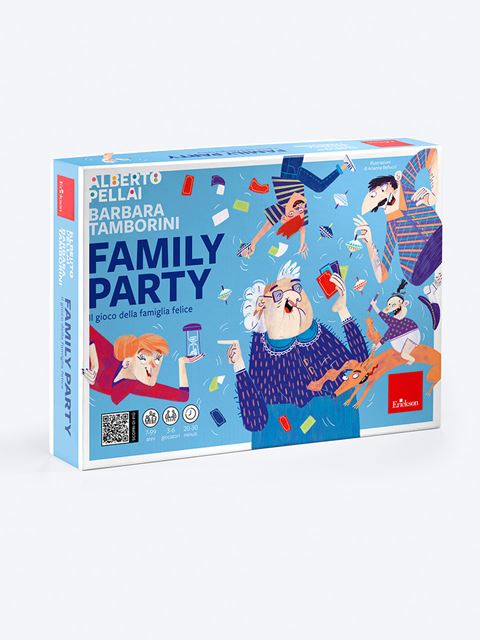 EN
EN
 PT
PT
The happy family game

Product: Teaching tools
ISBN: 9788859020776
Publication date: 01/03/2020
REQUEST A SAMPLE OR MORE INFORMATION
 Rights sold to:
Mexico
Rights sold to:
Mexico
A card game to play with the family to develop all 6 pillars of self-esteem! The game, designed by Alberto Pellai and Barbara Tamborini, is designed for children age 7 and over.
The box contains: 6 spinning tops, 60 cards, 1 hourglass and 1 block to create different games
The pillars of self-esteem that are focused on are:

The happy family game

A fun card game for developing self-esteem and strengthening family well-being!
Imitating, singing, telling stories, and making people laugh are just some of the challenges destined for young and old, to have fun together with loved ones and work on the six pillars of self-esteem: FAMILY, BODY, EMOTIONS, LEADERSHIP, SCHOOL / WORK, RELATIONSHIPS.
CONTENTS
The game Family Party includes:

31 Challenge cards focused on three areas: mind, body and heart

6 Bonus cards with collaborative challenges

24 Word cards with 3 words on each side: 1 noun (in yellow), 1 verb (in blue), 1 adjective (in pink)

1 Emotion card and 4 Situation cards

6 coloured spinning tops and 1 60-second timer

1 score pad
THE CARDS
The Challenge cards and Bonus cards describe the different tasks that players will have to do to try and win the Family Party game.
Each Challenge and Bonus card indicate if and how it will be necessary to use the Word, Emotion or Situation cards, and they have icons to indicate the time and the way in which each challenge will take place:

one turn of the timer, one spin of the top, or without time limits;

as an individual, with a partner (the player chooses someone) or all together.
Here are some of the cards included in the game, which have been translated into English to facilitate your evaluation:
HOW TO PLAY
Each player has 1 spinning top, paper to write on, and a pen or pencil. To play, participants must:
OBJECTIVES
Family Party has three main objectives:
AUDIENCE
This game was created for players aged 7 and up. It is particularly aimed at families, but can also be played with friends.
Read the complete instructions translated into English:
AUTHORS
Alberto Pellai is a doctor, child psychotherapist and researcher at the Faculty of Medicine and Surgery at the University of Milan. He deals with prevention in childhood. He conducts training courses for parents and teachers, and in 2004 he received the silver medal for public health merit from the Ministry of Health. He is the author of many books, including some fairy tales for children.
Barbara Tamborini is a psycho-pedagogist and writer. She deals with parenting support and affective and emotional education projects.